
WOLVERHAMPTON F.C.
Founded: 1877
Also Known As:
ST. LUKE'S FC (1877-79)
WOLVERHAMPTON WANDERERS (1879-)
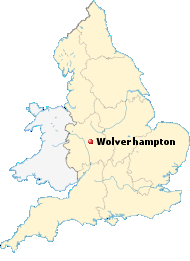
CLICK ON THE MAP TO
VIEW ENLARGED MAP
|
WOLVERHAMPTON WANDERERS F.C. (Football Club)
Included Info: Brief History, Club/Stadium Info, Team Jersey & Much More...
BRIEF HISTORY of the WOLVERHAMPTON FOOTBALL CLUB
(reproduced from 'Wikipedia' pages)
The club was founded in 1877 as St. Luke's by John Baynton and John Brodie, two pupils of St Luke's Church
School in Blakenhall. The team played its first-ever game on 13 January 1877 against a reserve side from
Stafford Road, later merging with local cricket and football club The Wanderers to form Wolverhampton
Wanderers in August 1879. Having become professional, the club were nominated to become one of the twelve
founder members of the Football League in 1888, in which they played the first Football League match ever
staged (against Aston Villa). They ended the inaugural season in third place, as well as reaching their
first FA Cup Final, losing 0–3 to the first "Double" winners, Preston North End. At the conclusion of the
campaign the club relocated for a final time when they moved to Molineux. Wolves lifted the FA Cup for the
first time in 1893 when they beat Everton 1–0, and added a second triumph in 1908, two years after having
dropped into the Second Division. After struggling for many years to regain their place in the top division,
the club suffered a further relegation in 1923, entering the Third Division (North), which they won at the
first attempt. Eight years later Wolves regained their top-flight status after winning the Second Division
title under Major Frank Buckley. With Buckley at the helm the team became established as one of the leading
club sides in England in the years leading up to the Second World War, as they finished runners-up in the
league twice in succession, as well as reaching the last pre-war FA Cup Final, in which they suffered a shock
defeat to Portsmouth.
The 1950s were by far the most successful period in the club's history. Captained by Billy Wright, Wolves
finally claimed the league championship for the first time in 1953–54, overhauling local rivals West Bromwich
Albion late in the season. Two further titles were soon won in successive years (1957–58 and 1958–59), as Wolves
cemented their position as the premier team in English football, becoming renowned for both their domestic
success as well as their staging of high-profile "floodlit friendlies" against top club sides from around the
world. The 60's decade opened with a fourth FA Cup victory and almost the first double of the twentieth
century, but the 1960s also saw the Wolves begin to decline. The manager was sacked in September 1964 in a
season that ended with relegation and the club's first spell outside the top division in more than thirty
years. This exile would last only two seasons though, as they became promoted in 1967 as runners-up. During
the close season, Wolves played a mini season in North America as part of the fledgling United Soccer Association
league which imported clubs from Europe and South America. Playing as the "Los Angeles Wolves", they won the
Western Division and ultimately the championship by defeating the Eastern Division champions Washington Whips
in a final decider.
The club's return to the English top flight heralded another period of relative success under Bill McGarry, with
a fourth place in 1971 qualifying them for the newly created UEFA Cup. En route to the UEFA Cup final, they
defeated the likes of Juventus and Ferencváros before losing to their countrymen Tottenham Hotspur 2–3 on
aggregate; a 1–2 home defeat in the first leg proving decisive. They lifted silverware though two years later,
when they won the League Cup for the first time by beating Manchester City 2–1 in the final. Despite relegation
again in 1976, Wolves bounced back at the first attempt as Second Division champions and, under manager John
Barnwell, the turn of the decade saw them finish in the top six and win the 1980 League Cup, when (then)
record-signing Andy Gray scored the only goal of the final to defeat European champions Nottingham Forest.
The multi-million pound rebuilding of the Molineux Street Stand in 1979 was to be the catalyst for the club's
near-financial ruin during the next decade as difficulties in repaying the loans taken out to fund it led to
receivership and relegation in 1982. It was not until 2003 that Wolves were promoted, when they defeated
Sheffield United 3–0 in the play-off final under Dave Jones to end a nineteen-year absence from the top level.
Their stay proved short-lived though, as they were immediately relegated back to the newly retitled Championship.
|
CLUB FACTS & INFORMATION
| Official Name
| --
| Wolverhampton Wanderers F.C. |
| Club Nickname
| --
| The Wolves |
| Year Founded
| --
| 1877 (140 years ago) |
| English County
| --
| West Midlands |
| Current Ground
| --
| Molineux |
| Ground Location
| --
| Wolverhampton, England |
| Club's Owner
| --
| Fosun International |
| Club Chairman
| --
| Jeff Shi |
| Current Manager
| --
| Nuno Espirito Santo |
| Current League
| --
| Championship |
| Last Season
| --
| Championship, 15th place |
HOME COLORS

Gold & Black |
AWAY COLORS

Light Blue w/White Trim |
|
| |
INTERESTING STADIUM FACTS & INFORMATION

MOLINEAUX STADIUM
Waterloo Road, Wolverhampton,
West Midlands, WV1-4QR, England
OPENED: ......... 1889
SURFACE: ........ Grass
COST: .............. not available
CAPACITY: ...... 31,700
RECORD: ......... 61,315 (1939 vs Liverpool)
OWNER: ........... Wolverhampton Wanderers F.C.
OPERATOR: ..... Wolverhampton Wanderers F.C.
FIELD SIZE: ..... 109 x 70 yards (100 x 64 meters)
|
|
|
HOME JERSEY
 |
AWAY JERSEY
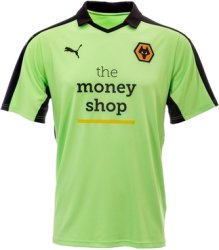 |
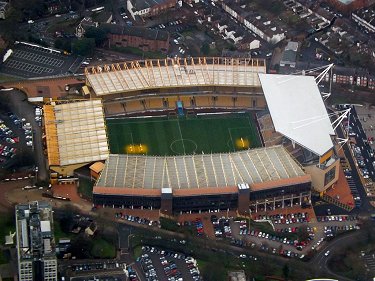
Click On Aerial Photo To View/Download Enlarged Image
|
Molineux Stadium (Wolverhampton) Seating Diagram
Click On Diagram Below To Enlarge View
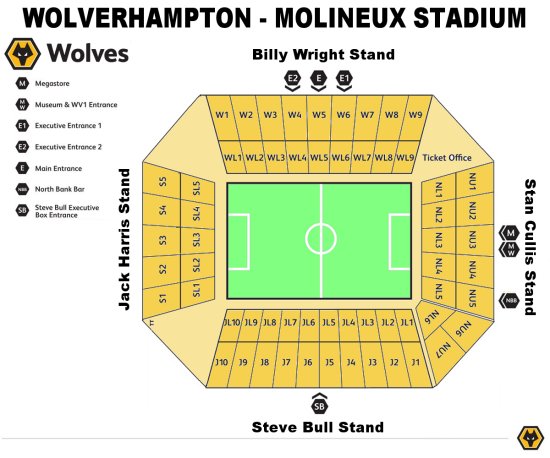
|



WOLVERHAMPTON STADIUM WALLPAPERS (Free Download)
Wallpaper Size below is 800x600: To Download Bigger Sizes, Click On Any Button Shown Above
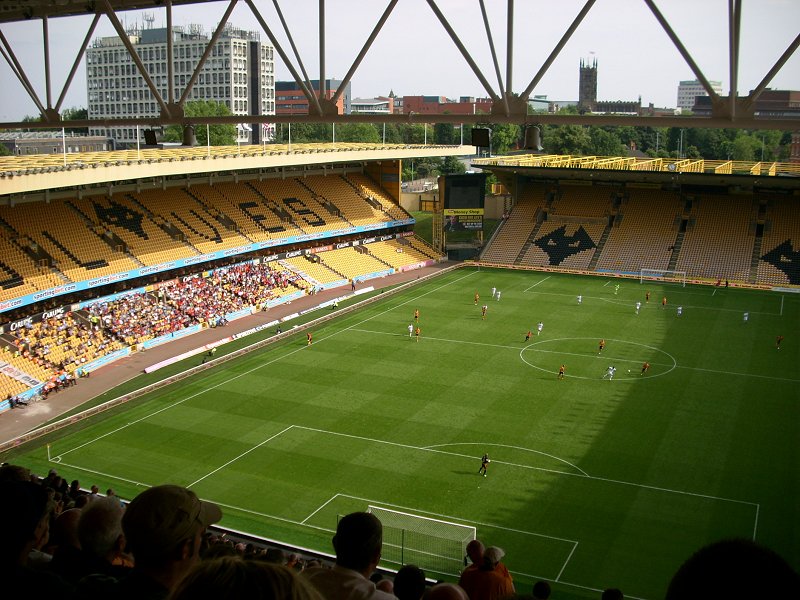
|
|

